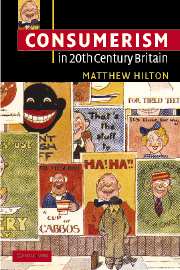Book contents
- Frontmatter
- Contents
- List of illustrations
- Acknowledgements
- List of abbreviations
- Introduction: luxury's shadow
- Part I Necessity
- Part II Affluence
- 6 The new consumer: good housewives and enlightened businessmen
- 7 The professionals: the origins of the organised consumer movement
- 8 Individualism enshrined: the state and the consumer in the 1960s
- 9 The right to shop: consumerism and the economy
- 10 The duty of citizens: consumerism and society
- 11 Affluence or effluence: globalisation and ethical consumerism
- Conclusion: the quantity or the quality of choice
- Bibliography
- Index
6 - The new consumer: good housewives and enlightened businessmen
Published online by Cambridge University Press: 10 December 2009
- Frontmatter
- Contents
- List of illustrations
- Acknowledgements
- List of abbreviations
- Introduction: luxury's shadow
- Part I Necessity
- Part II Affluence
- 6 The new consumer: good housewives and enlightened businessmen
- 7 The professionals: the origins of the organised consumer movement
- 8 Individualism enshrined: the state and the consumer in the 1960s
- 9 The right to shop: consumerism and the economy
- 10 The duty of citizens: consumerism and society
- 11 Affluence or effluence: globalisation and ethical consumerism
- Conclusion: the quantity or the quality of choice
- Bibliography
- Index
Summary
Modern, value-for-money, comparative-testing consumerism did not begin with the establishment of the Consumers' Association in 1956. In 1945, the National Council of Women (NCW) set up an Advisory Committee on Consumer Goods and approached the British Standards Institution (BSI) with a view to extending the work on standards to domestic commodities. The following year, six representatives of the Advisory Committee met at the BSI for the first time ‘to offer to the BSI the views of women as consumers on specifications which were in the course of preparation, concerned with household goods and similar subjects’. It was a type of consumerism unrecognisable from the socialist politics of necessity espoused by many labour organisations before the Second World War. The NCW was an umbrella organisation for largely middle-class and socially and politically conservative women's organisations such as the Women's Institute (WI), the Townswomen's Guild, the National Federation of Business and Professional Women's Clubs and the Women's Voluntary Service. The Advisory Committee's terms of reference were restricted to providing the ‘consumer’ view on matters determined or already set in motion by the BSI. Its creation in 1946 appears to have been a purely conciliatory measure. At its first meeting, the BSI Director did not even bother to welcome them, preferring instead to send a memorandum dictating the items to be discussed (that is, the already drawn-up standards for building materials and the sizing of women's garments).
- Type
- Chapter
- Information
- Consumerism in Twentieth-Century BritainThe Search for a Historical Movement, pp. 167 - 193Publisher: Cambridge University PressPrint publication year: 2003

